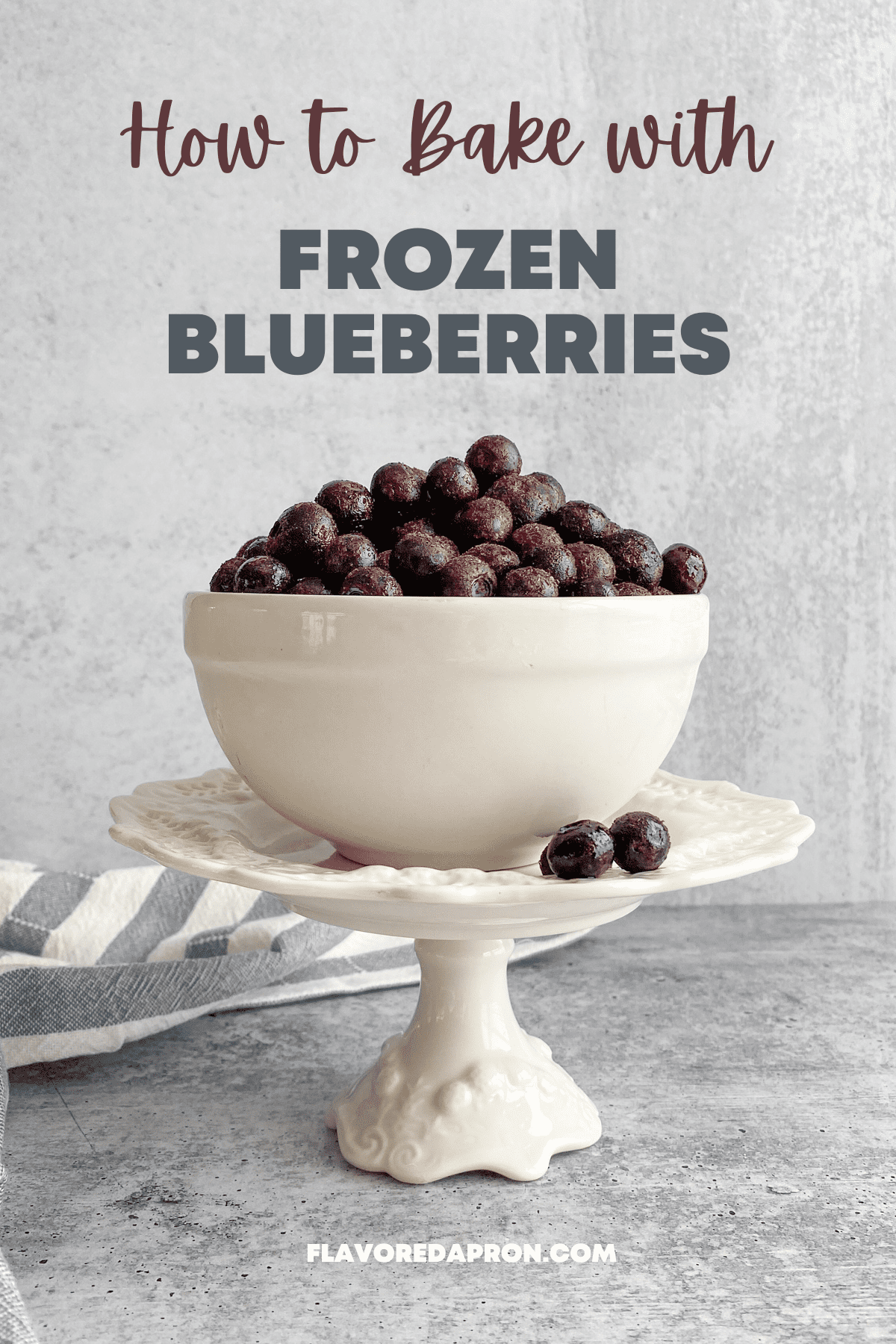
Let’s face facts, fresh blueberries are in-season for a very short time and the rest of the year they can be a little expensive to buy.
But enjoying a blueberry pie, blueberry crumble a la mode or other baked pastry doesn’t have to be limited to summer months.
Enter frozen blueberries.
Baking with frozen blueberries actually works well when a few additional steps are taken before stirring them into the batter.
That’s why I always have a freezer full of frozen blueberries.
At a moment’s notice I can make my favorite recipe for blueberry crisp with frozen berries and it’s just as delicious (if not better) than fresh blueberries.
Frozen blueberries also are perfect for making blueberry compote sauce.
With the tips that follow, see how to bake beautiful and delicious blueberry muffins, pies and crisps from frozen blueberries.
Baking with Frozen Blueberries vs Fresh
If you’ve ever wondered if you can bake with frozen blueberries, I’m here to tell you, you can.
Baking with frozen blueberries can have some disappointing results if you don’t use them properly, like a soggy pie crust, blue-tinged muffins or even blue-stained teeth.
We’ve all seen blueberries bleeding into muffins.
But it’s easy to prevent runny blueberry desserts when the frozen berries are rinsed, thawed and dusted with flour. (See instructions below.)
On the plus side, frozen blueberries are flash frozen at peak season, preserving both the flavor and nutrients.
Additionally, it’s usually cheaper to buy a bag of frozen blueberries compared to out-of-season fresh blueberries. Dessert recipes usually call for more than a pint, so the cost of fresh berries can add up quickly.
Another thing I love is, it’s easy to keep blueberries on-hand in the freezer—perfect for when those blueberry-crisp cravings hit.
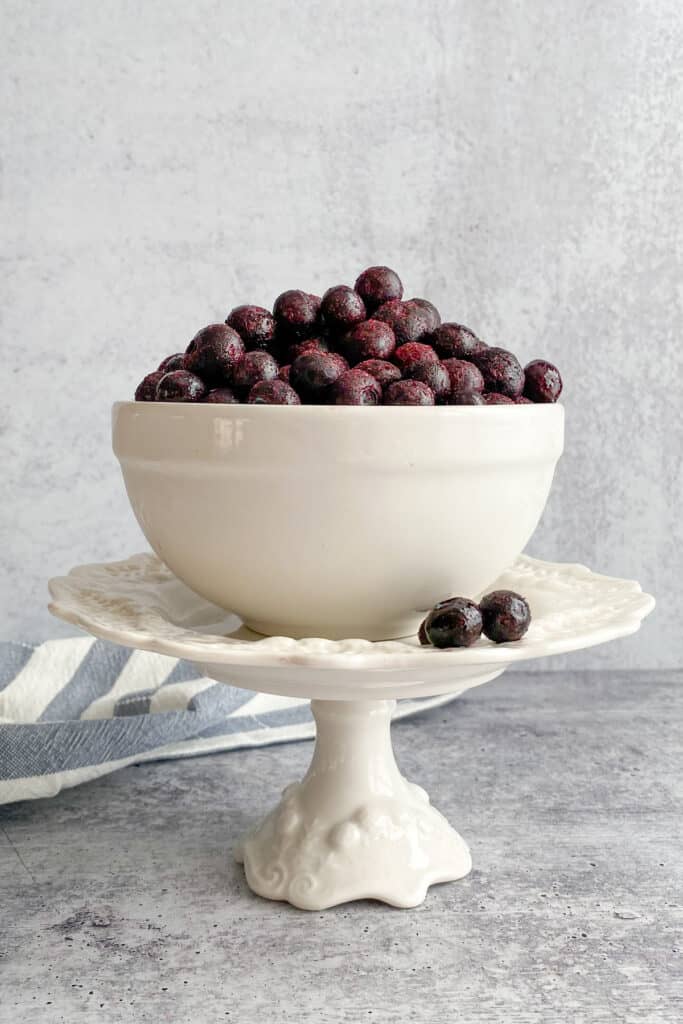
3 Tips for Baking with Frozen Blueberries
1. Rinse and thaw blueberries before baking.
Rinsing and thawing frozen blueberries for baking is the single most important step you can take.
Why you need to rinse and thaw the berries:
Frozen blueberries have ice crystals on them. If you don’t thaw them prior to baking, the ice crystals will melt in the oven and make the baked good runny or soggy.
Additionally, the berries need to be rinsed to stop the blueberries from bleeding and to prevent muffins and breads from turning an unappetizing shade of gray.
How to rinse and thaw frozen blueberries properly:
It only takes a few minutes to thaw frozen blueberries using the cold water bath method.
I find it works best to put the berries in a strainer or colander.
Then, run cold water over the berries. Pour out the purple water and repeat this process several times until the water no longer turns purple.
Lastly, let the colander of berries sit in a bowl of fresh water for a several more minutes until they have thawed completely.
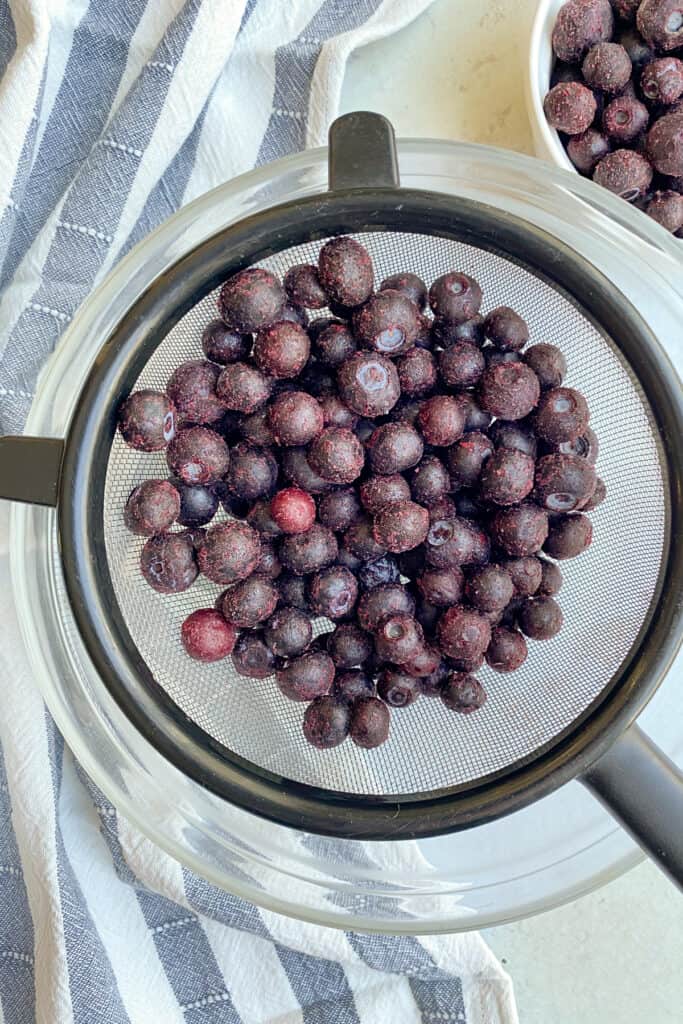
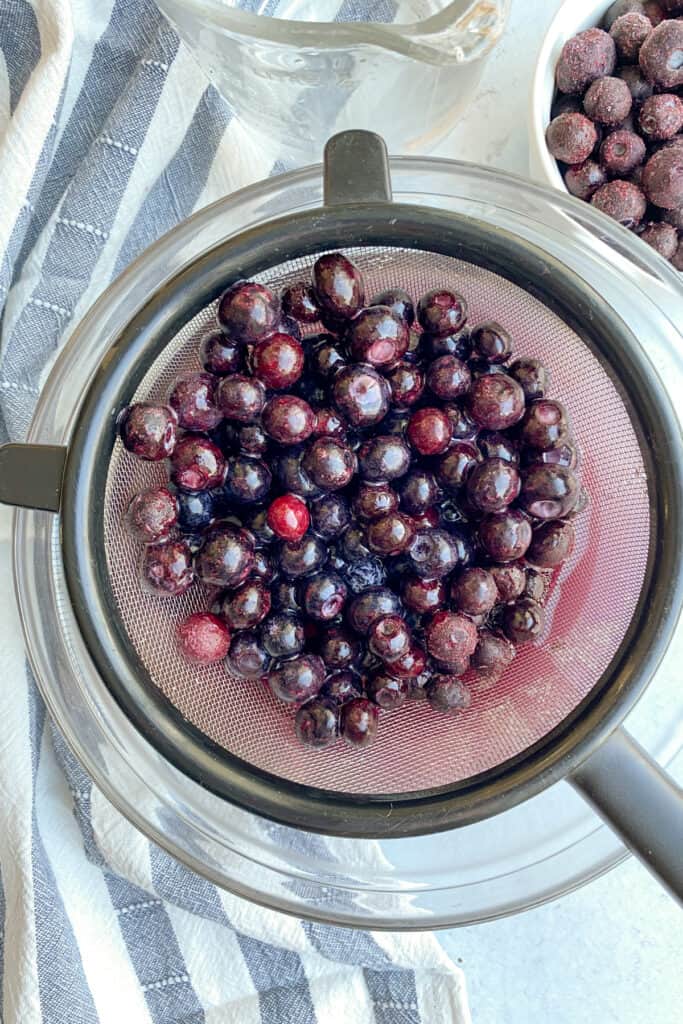
When the rinsing and thawing process is finished, the next step is to pat them dry—carefully.
Thawed blueberries are quite fragile, so go easy on them.
I find it works best to line a cutting board or tray with paper towels and then roll the berries onto them. Then lay another paper towel over the top to absorb more water.
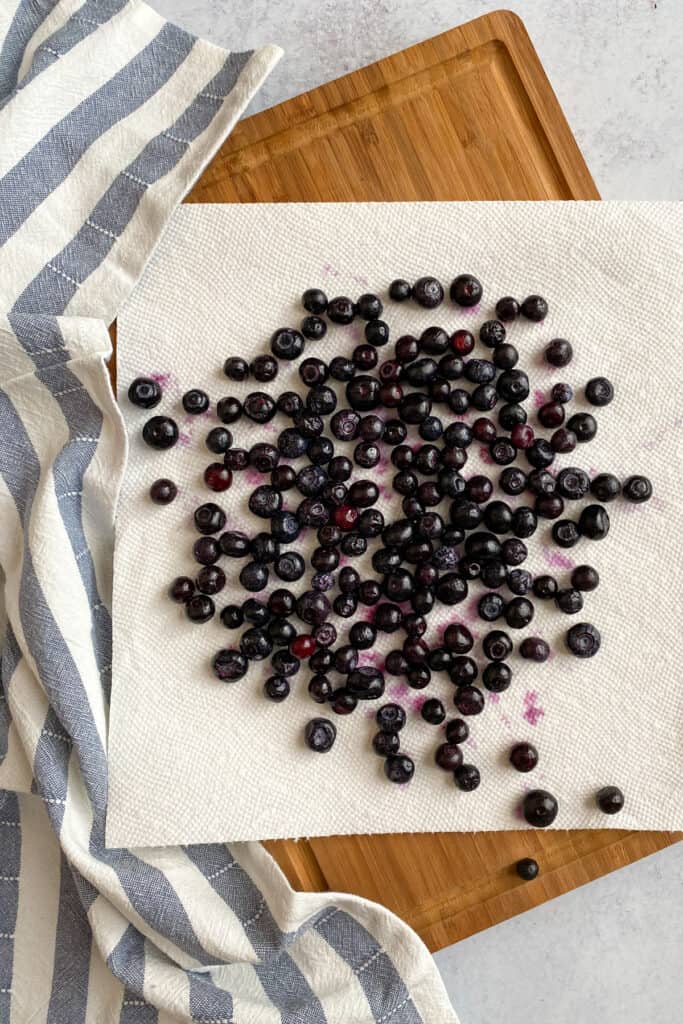
2. Coat Blueberries in Flour
Lightly dusting the thawed blueberries in flour is another way to reduce the amount of blue that gets mixed into the batter.
For desserts with blueberry filling like pies and baked crisps, this step isn’t necessary. However, you can flour the berries if you want to help thicken the juices that form during baking.
In addition, the flour helps suspend the berries so they’re less likely to sink to the bottom of the muffins, bread and cake.
To coat them, just put a small amount of flour in a shallow pan and roll the berries back and forth.
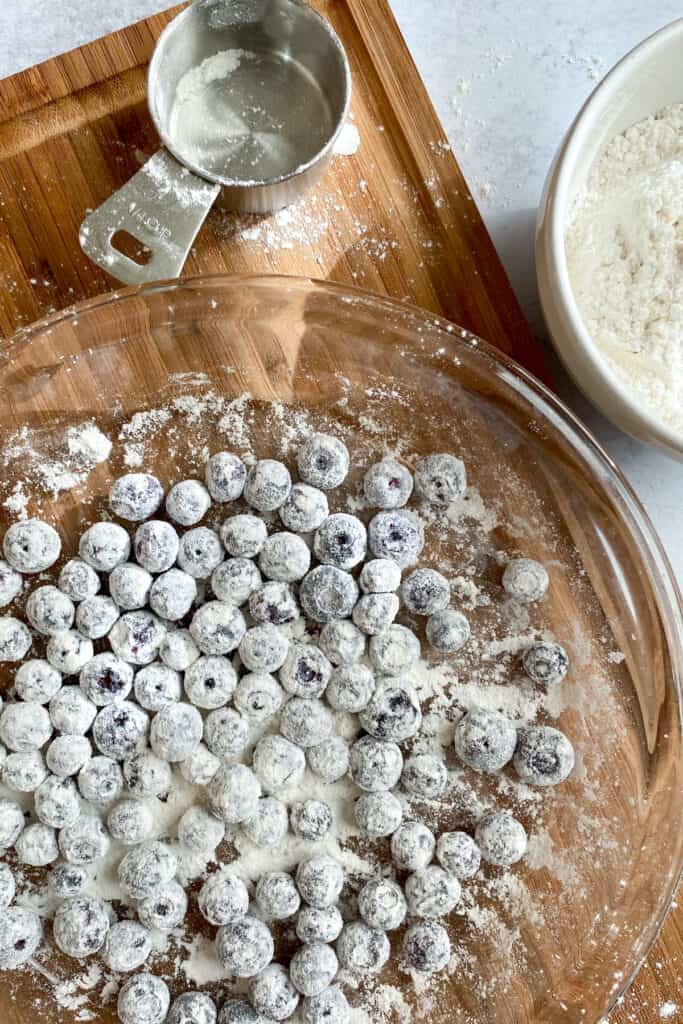
3. Gently Stir Berries into the Batter
The final step, to prevent bleeding blueberries and batter that turns blue, is to gently fold the blueberries into the batter.
Do your best to keep the blueberries from getting smashed, but if you see a few little streaks that’s ok.
Then, get your item in the oven as soon as possible. This way the berries can get baked into place.
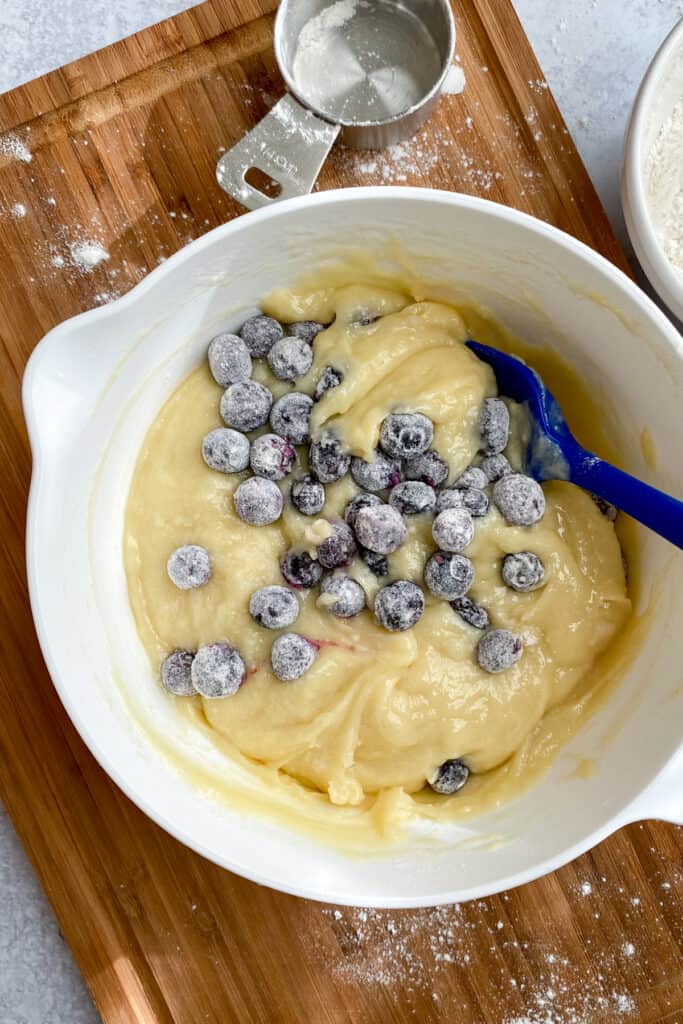
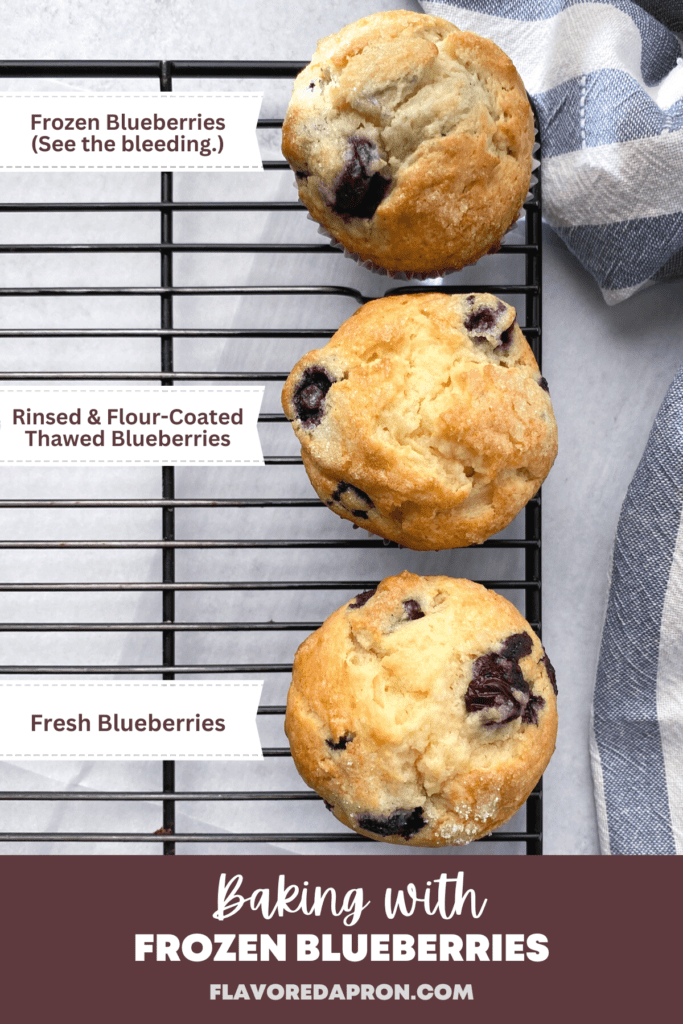
Do I always have to thaw frozen blueberries before baking?
It’s not a requirement to thaw frozen blueberries for baking, but it is highly recommended.
If you’re baking something with a short cooking time like blueberry pancakes, however, thawing is a must.
Keep in mind, if you bake with completely frozen blueberries, you may need to add more baking time.
And for blueberry fillings made with unthawed berries, consider adding a little extra flour as a thickening agent or a cornstarch slurry.
Does rinsing frozen blueberries remove nutrients?
Washing blueberries is always recommended. Unlike bananas and fruits with thick skins, blueberries are exposed to soil, bacteria and residues, and can potentially cause a food-borne illness.
So there really is no question whether to rinse or not. Rinse!
Whether you buy them fresh, grow them in your garden, or are using frozen berries, ideally put off washing until you’re ready to eat them.
One cause for concern, however, is that rinsing blueberries, as well as other fruits and vegetables, may cause a loss of nutrients.
And it is true, water-soluble vitamins like C may be washed down the drain.
But the loss of vitamin C in blueberries can be kept to a minimum by not soaking them for too long.
However, my guess is, if you’re making a sweet blueberry dessert, a little less vitamin C isn’t much of a concern anyway.
How to Freeze Fresh Blueberries
Are you wondering how to freeze blueberries after picking a bunch?
Or are you trying to figure out how to freeze them so they don’t stick together.
Here’s what to do.
Do not wash blueberries before freezing.
Blueberries have a naturally protective layer to stop bacteria. You don’t want to wash that off.
Additionally, washing the berries before freezing causes them to stick together and get mushy.
Give them a rinse when you thaw them.
Spread blueberries in single layer on tray.
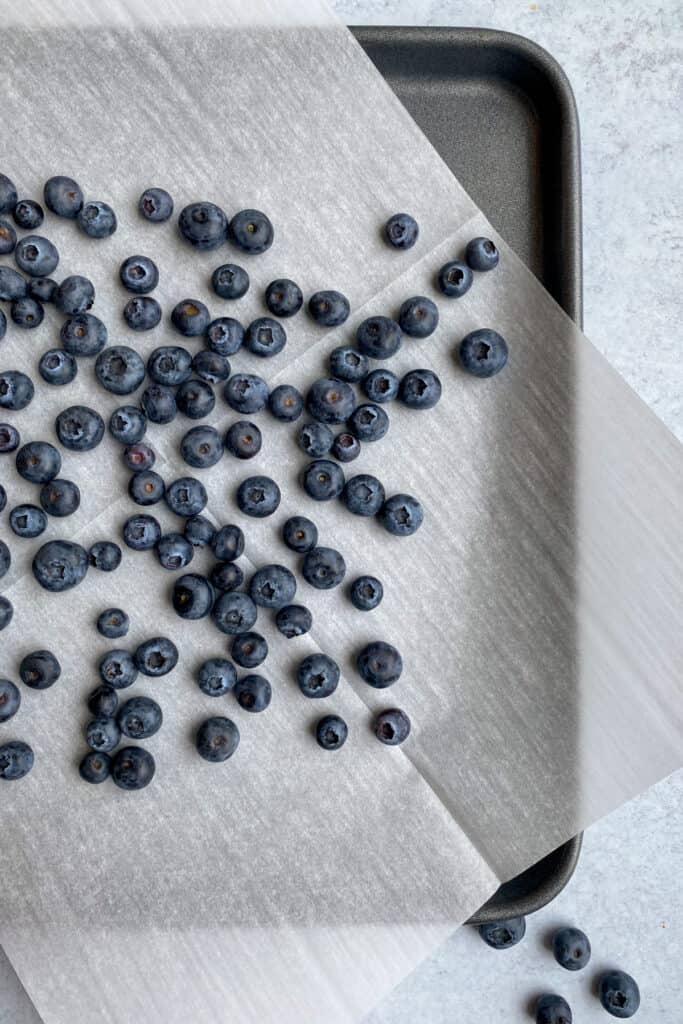
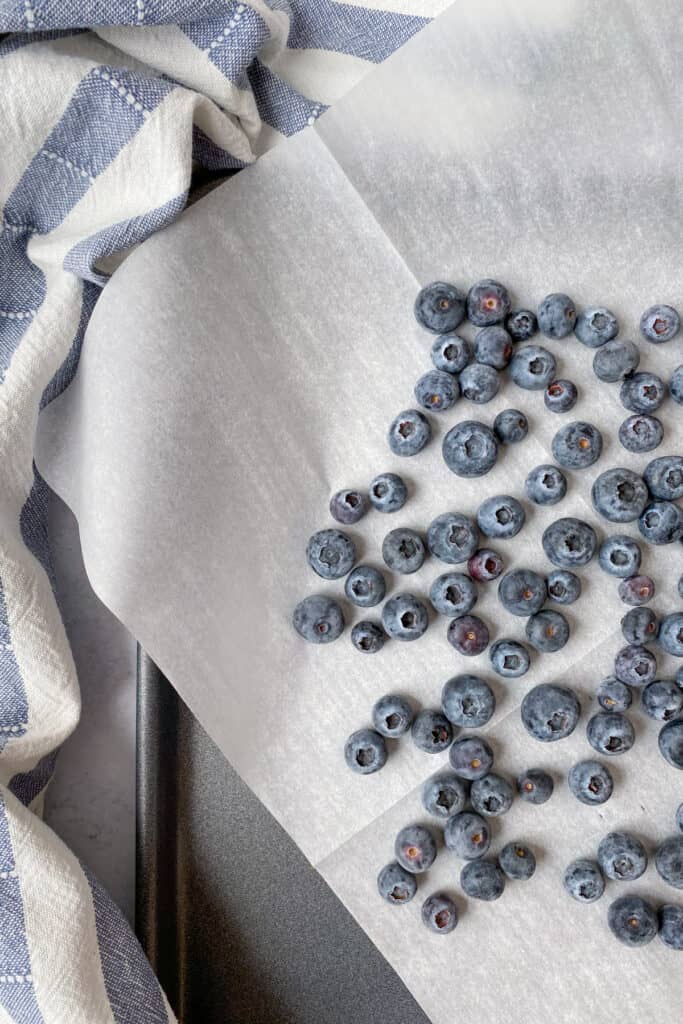
Line a tray with parchment paper to prevent sticking.
Put the tray of blueberries in the freezer for at least 4 hours, but overnight is preferable. Do not stack trays and risk smashing the fruit.
Store individually frozen berries in a freezer bag.
Transfer the berries from the tray to a bag and remove all the air out of it before sealing. For added measure, I like to put the freezer bag of berries in a plastic container with a lid so they don’t get crushed.
Wash the frozen berries when you’re ready to use them.
Since the blueberries weren’t washed prior to freezing, be sure and give them a cold water rinse before eating. If you’re baking with the frozen berries, thaw them first.
Questions About Baking with Frozen Blueberries
The best way to keep frozen blueberries from bleeding is to rinse and thaw them before baking. Dusting the berries with flour also helps.
Frozen blueberries can be used in any baked good, including muffins, but it’s best to rinse and thaw them first.
While it’s not required to thaw frozen blueberries before baking, your baked item will turn out better if you do. If you choose to use frozen berries, you may need to increase the baking time.
